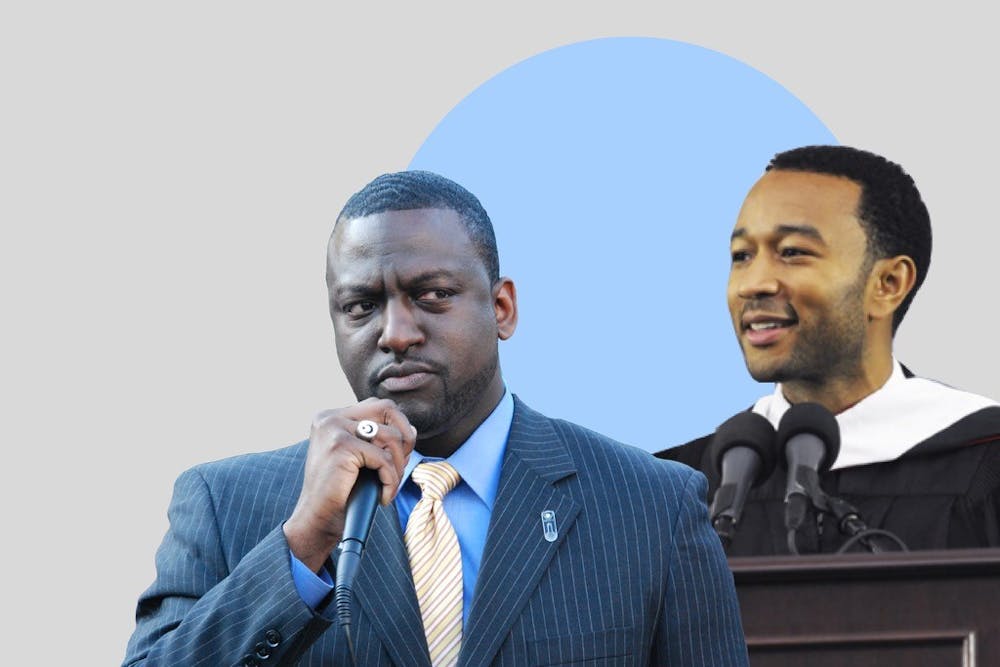Eleven-time Grammy winner and 1999 College graduate John Legend and Yusef Salaam, one of the since-exonerated men in the “Central Park Five” case, advocated for nationwide criminal justice reform to build safer communities at a virtual panel held by Penn Law School on Tuesday evening.
The event, titled "Seeing Us, Hearing Us" was part of Penn Law's year-long Achieving Racial Justice series, which aims to combat anti-Black racism and violence within Penn Law and in the larger community. Legend and Salaam discussed the imperative for progressive prosecution reform, which often includes a commitment to public safety and reducing mass incarceration. The panelists criticized the United States law enforcement system which they said claims to serve and protect all communities but disproportionately harms communities of color.
The conversation was moderated by John Hollway, the Executive Director of the Quattrone Center for the Fair Administration of Justice.
“We need to be able to live in a society where we are not afraid to be walking all Black, driving all Black, and to just be Black, where we can’t be unarmed because of the color of our skin,” Salaam said.
In 1989, Salaam was one of five Black and Hispanic teenagers who were wrongfully incarcerated for the rape of 28-year-old Trisha Meili. Salaam was 15 years old at the time of the trial, and was exonerated in 2002 after spending six years in prison for false accusations of a crime committed by Matias Reyes.
Salaam's life would have been very different if he had a prosecutor who sought the truth, as prosecutors are given significant discretion in the handling of each case, Legend said.
He added that the United States government has neglected the wellbeing of communities of color, focusing public safety efforts on policing, jailing, and imprisonment instead. True reform requires building healthy communities with widespread access to food, healthcare, and education, which will ultimately prevent crime, he said.
“For too long, the government has seen [their] role as keeping everyone else safe from people who look like us and not protecting and serving us," Legend said. "[They are providing] no public safety to us but providing public safety to everyone else from us.”
RELATED:
Penn Law brought 551 students to campus for a hybrid fall semester deemed a 'success story'
'Expected to fail’: Black Penn engineers recount experiences of racism at event with deans
Sadiq Davis speaks about the difficulties of life after incarceration at Penn event

The panelists also discussed how the police killing of George Floyd on May 30, 2020 reignited widespread support for racial justice reform and prompted calls to defund the police across the country. Hundreds of local community members came together over the summer on Penn's campus and in Philadelphia to protest police brutality, as well as call on the University to defund the Penn Police Department.
To benefit communities and lessen the need for police, Legend said that it's necessary to reallocate funding from police departments to programs intended to prevent crime and homelessness.
“It’s more edifying to invest more money in quality of life, health, education, and improving the culture of our communities and doing all the things to make it safer, healthier, and reducing the need to spend it on policing and imprisoning,” Legend said.
Even after formerly incarcerated individuals leave prison, Legend said that for the rest of their lives, they are often viewed differently and lack access to resources typically available to other Americans.
“Give them the opportunity to build a life, it’s better for us if they have a purpose and don’t have to turn to the black market or underground economy to make money," Legend said. "This will make us all safer. We have to look at them like our human capital.”









